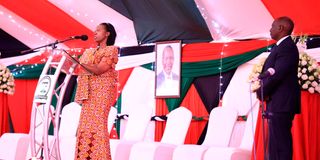Secret meetings: When denial is more than just a river in Egypt

Martha Karua of Azimio la Umoja coalition speaks after she was invited by then Deputy President William Ruto during the 19th National Annual Prayer Breakfast at Safari Park Hotel in Nairobi on May 26, 2022. Ms Karua has denied holding meetings with Dr Ruto prior to May 2022.
We have considered together how a statement or message intended to constitute a robust denial can go awry. Unintended consequences are immanent in every human endeavour.
Which is why we must exercise the ‘negative’ gifts of doubt and hesitation whenever confronted by exuberant emphasis, be it by way of melodramatic avocations or vehement denunciations.
Having said so, and notwithstanding evidence to the contrary, this is not primarily a tutorial on the art and science of denial.
It may, however, be a discussion that extends to the causes and reasons for refutation as well as the nature and characteristics of the thing denied.
It is generally assumed that we contest things that we do not accept on account of their being factually inappropriate. But that is because we fail to see what poses dazzlingly before us: that denial is the effect of moral discomfort with the proposition under consideration, and not merely with it’s rational felicity.
When a criminal frantically exclaims, “No! No! It cannot be!”upon being adjudged to be culpable of a felony or some other grave delict, or upon the infliction of a condign sentence, he is neither repudiating the judge’s competence nor the factuality of the utterances being made.
The criminal is probably reacting to the repugnance of the consequences of his acts together with their implications for the conduct of his future existence.
Indeed, denial is principally the reflexive expression of visceral revulsion of being identified, associated or indeed, in any manner whatsoever, connected with an object that one finds abhorrent.
Thus, as well as a form of linguistic action, denial is an expression of a moral state. Understood this way, it can help us speculate better about the context of denial in such historical event as occured at the high priest’s house two thousand years ago.
It also enables us examine and analyse with greater competence the actions of Hon Martha Karua in respect of Hon William Ruto, now the president by the grace of God.
Recently, David Ndii instigated one of his regular social media storms when he suggested that Ruto was a sponsor of the Linda Katiba action group which brought the Building Bridges Initiative down to its knees.
Ndii catalysed the ferocity of the ensuing hysteria by stating that Karua and Ruto regularly conferred in the months prior to May 2022, and that she had been considered as a possible candidate for Ruto’s running mate.
Hustler’s mansion
It may be confirmed by any number of the ‘Tangatanga’ faithful that Karua was indeed a regular, if unremarked presence at the ‘Hustler’s Mansion’, now ‘Riggy G’s Digs’, and that this was possibly her leverage in negotiating with Azimio.
This makes her stout denial of Ndii’s statements all the more curious. What, exactly, was Karua denying?
To answer this question, we must go back awhile, and revisit an older, yet nearly identical denial. To mark 10 years of devolution, Oliver Mathenge gave an engrossing retrospective, which provides an accurate account of the intricate ins and outs of the political process leading to the promulgation of the constitution.
Any dependable analysis of the parliamentary phase of constitution-making must elucidate that ‘2012’ was implicit to the complicated and often counterintuitive calculations that many leaders made.
In our vernacular, some numerals, chiefly denoting General Election years, function as proper nouns. Thus 1997, 2002, 2007, 2013, 2017 and 2022 are often enunciated without preamble as self-explanatory references to political events.
2012, falling 5 years after 2007, was the accepted shorthand for the election next following, but was litigated all the way to the Supreme Court and turned out in fact to be 2013.
In the intense mystifying fog of that constitution-making season, Karua and Ruto, hitherto implacable foes, forged a found common cause and forged a formidable duo with each seeming to strike out from their respective political regiment to execute innovative moves, to the consternation of many observers.
Along the way, it was reported that Karua and Ruto had held several night meetings sometime in 2009 with the aim of configuring a wild card ticket for 2012.
Now, night meetings are the gold standard for aggressive coalition building in high-stakes political contests. Karua issued a vigorous threat-laden denial which sagged under the weight of haughty disaffection with the ridiculousness of the allegation.
It was Cyrus Jirongo, not David Ndii, who came out with further and better particulars of the times, places, persons and agenda of these meetings, causing Karua, then a daunting personage, to relent.
As then, now. Why does Karua seem unable to stop herself from strenuously disaffirming her encounters with Ruto? Clearly, it is not a matter of whether the events denied actually took place.
The spirited rebuttals emanate from the other possible place denial springs from: contempt. As Mark Twain said, denial more than just a river in Egypt.
- Mr Ng’eno is an advocate of the High Court.




